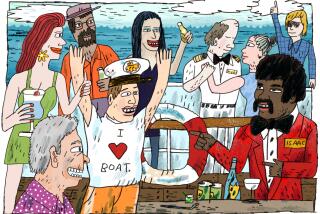Outlook for Cruise Vacations Uncertain for Next Year
- Share via
The cruise industry had hoped 2003 would bring an end to the uncertainty that has shadowed the business since the terrorist attacks. With the recent outbreak of stomach viruses among ship passengers, the outlook for next year is even more unclear.
Industry executives and analysts already were wondering if the United States would go to war with Iraq, possibly prompting cruise passengers to stay home. The question now is whether the gastrointestinal virus outbreaks will affect future bookings.
The industry also is waiting to learn whether shareholders will approve a planned merger between No. 1 Carnival Corp. and No. 3 P&O; Princess Cruises.
The first signs of how the industry will fare overall in 2003, and whether it has been affected by the on-board ailments, will come in the “wave season,” the period between Jan. 1 and March when most travelers book summer cruises.
“The question is whether passengers’ perception of the cruise sector changes in a long-term sense once news coverage [of the outbreaks] has faded,” said Robin Farley, an analyst with UBS Warburg.
Some passengers, including several boarding Holland America’s Amsterdam on its first sailing after a nine-day cleaning, expressed concerns, but opted to continue with their vacations.
John Ohlmann of Melbourne, Fla., was one of several dozen who became ill on a Caribbean cruise aboard Disney’s Magic. He said the incident has not soured him on taking another cruise vacation.
Meanwhile, the industry is still recovering from the drop-off in revenue after the Sept. 11 attacks and waiting to see if world events will affect their business again. Two companies -- American Classic Voyages and Renaissance Cruises -- were forced to file for bankruptcy protection, while the rest struggled to fill their cabins.
Cruise lines responded to the attacks by moving ships closer to home and to ports in secondary markets such as New Orleans, Baltimore and Corpus Christi, Texas. That trend is expected to continue next year.
“I see it in fact as the next great growth wave of this industry, bringing high-quality ships into all kinds of different ports with large populations,” said Colin Veitch, president and chief executive of Norwegian Cruise Line.
The cruise line recently announced it was adding departures from Baltimore, Houston and New Orleans, for a total of 12 U.S. ports.
Miami-based Royal Caribbean Cruises Ltd. expanded new sailings in 2002 from six U.S. cities.
“We probably would have gone there eventually anyhow, but 9/11 gave us an impetus to accelerate,” said Richard Fein, Royal Caribbean’s chairman and chief executive.
The strategy is in line with some analysts’ outlooks for next year, which favor cruises to the Caribbean and Alaska over Europe, whether or not there’s a war in Iraq.
So far, passengers don’t seem concerned.
Paul Keung, an analyst with CIBC World Markets Corp., said cruise operators are “having no problems filling ships as long as a consumer feels somewhat confident within a 30-day period.”
Micky Arison, chairman and chief executive of Miami-based Carnival, said the impact of a possible war would depend on whether it is a short or protracted conflict.
“If we are dealing with a relatively short war, I’m not overly concerned with the impact on the company,” he said.
Cruise prices have slowly crept up over the year, although prices for some December cruises have declined. Prices for cruises departing in January or later appear to be flat, with some increases, according to a survey by Raymond James & Associates Inc.
If Carnival’s $5.4-billion takeover of P&O; Princess Cruises is approved, it is not expected to have much impact on consumers, at least initially, said Joseph Hovorka, an entertainment and leisure analyst for Raymond James.
The Carnival-P&O; merger would create a powerful company with a fleet of 64 ships and market share approaching 50% by 2005. No. 2 Royal Caribbean’s 24% market share could decline to near 20% by 2005, said Jill Krutick, a leisure analyst with Salomon Smith Barney.
Royal Caribbean would remain “a powerful No. 2 player, and its young, high-amenity fleet should enable it to compete effectively,” she said.
More to Read
Sign up for The Wild
We’ll help you find the best places to hike, bike and run, as well as the perfect silent spots for meditation and yoga.
You may occasionally receive promotional content from the Los Angeles Times.






